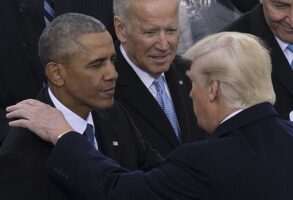Published January 14, 2015
The Catholic Difference
The transfer of the celebration of the Epiphany to a Sunday from January 6 (the solemnity’s traditional date), and the elimination of Sundays-after-Epiphany in favor of the ill-named Sundays of “Ordinary Time,” has made a hash of the Christmas liturgical season, as I suggested in Evangelical Catholicism. Still, the liturgical calendar of Blessed Paul VI does us a service by highlighting the formerly insignificant Feast of the Baptism of the Lord as the terminus of the Christmas season.
And that service is to remind us to remember, cherish, celebrate the date of our own baptism.
When I first started working on pro-life and religious freedom issues with Evangelical Protestants, some thirty years ago, I was struck by the way these folks introduced themselves at a meeting. Most Americans, in such circumstances, identify themselves by occupation: “I’m John Smith and I’m a lawyer with Smith Jones” or “I’m Jane Doe and I’m a pediatrician at Children’s Hospital.” My new friends didn’t do that. Rather, they’d say “I’m John Smith (or Jane Doe) and I was born again on such-and-such a date”—which was usually when the person in question was a young adult.
Contrarian that I can be on occasion, I would say, when the introductory rites came around to me, “I’m George Weigel and I was born again on April 29, 1951 . . . at which point I was precisely twelve days old.” That drew the occasional blank stare, but it often led to interesting conversations about sacramental regeneration.
My evangelical friends’ sense that the day of their being “born again” was the defining moment of their lives, and my Catholic convictions about what had happened to me on April 29, 1951, came into harmonic focus when, in preparing the first volume of my biography of St. John Paul II, Witness to Hope, I described the pope’s return to his parish in Wadowice on his epic first papal pilgrimage to Poland in June 1979. Stepping into the church where he had served Mass, received the scapular, and prayed daily during his youth, the 264th Bishop of Rome went straight to the chapel that housed the baptismal font and venerated the place where he had been “born again” in 1920.
Why? Because Karol Wojtyla knew that that day was the most important day of his life: the day when he was first empowered, by water and the Spirit, to become a friend of the Lord Jesus Christ and a missionary disciple. As John Paul understood it, the most important day of his life was not the day on which he was ordained a priest, consecrated a bishop, or elected pope. The most important day of his life was the day of his baptism. Everything else flowed from that, like the waters in Ezekiel’s vision, flowing from the restored Temple to renew the face of the earth.
In discussing “Evangelical Catholicism,” the book and the idea, with dozens of audiences in various Catholic venues around the country and the world over the past two years, I’ve often conducted a little pop-quiz, asking my audience how many of them know the date of their baptism. I once got close to a 10 percent positive response, but the norm is usually in the 2–3 precent range. I then tell the story of my evangelical friends, and the story of John Paul II, and suggest that those present should, on returning home, take out the file where they keep the “Catholic stuff,” look up the date of their baptism on their baptismal certificate, memorize it—and then celebrate that day in some special way every year hence.
I’ve been doing that for a decade and a half now, prodded a few months ahead of time by the liturgical Feast of the Baptism of the Lord. Like the Lord, on the day of our baptism, each of us received a commission: in our case, to be the disciples who take Christ’s mission into the world, every day. Owning that is how we become the “Church in permanent mission” to which Pope Francis has called us.
George Weigel is distinguished senior fellow of the Ethics and Public Policy Center in Washington, D.C.







